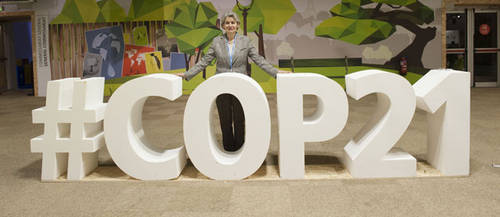Director-General welcomes COP21 agreement and underlines the momentum in changing minds not the climate
The Director-General of UNESCO, Irina Bokova, Saturday welcomed the historic agreement reached by participants at the 21st Conference of the Parties to the United Nations Framework Convention on Climate Change. “Beyond this ambitious and balanced agreement, COP21 has created a momentum in changing peoples’ minds and preparing them to embrace the economic and life-style adjustments we all need to make to preserve human life on the planet,” Ms Bokova said.

Pilar Chiang-Joo
“Changing minds, not the climate” has been UNESCO’s motto at COP21. The Organization’s programmes and expertise were showcased in a wide range of side events during the Conference, highlighting the potential of the natural and social sciences, ocean research, education and culture to foster new approaches to development with a view to reaching the goals of the United Nations 2030 Sustainable Development Agenda, adopted by the General Assembly in September.
"The Paris Climate Change Conference has highlighted a new global awareness and unprecedented commitment to protecting the planet through solidarity and joint action,” said Ms Bokova. “We must carry this spirit forward in implementing the 2030 Agenda. UNESCO's vision is clear: We need to change minds not the climate, using education, scientific cooperation, critical thinking and debate made possible through freedom of expression and information, which we promote worldwide. This is a single agenda for a better future for us all."
The Director-General however stressed that COP21 marked one step on the road to limiting the damage human activity has been causing to our environment and that UNESCO was looking forward to working with Member States to support concerted international action and laying the ground for more progress at next year’s COP22, which will be hosted by the government of Morocco.
During the Conference of Parties, UNESCO’s International Hydrological Programme (IHP) in cooperation with the International Panel on Climate Change (IPCC), highlighted ways to translate science into actionable policies and mobilize education to raise awareness and drive change.
Through exhibitions and numerous events, UNESCO’s Intergovernmental Oceanographic Commission (IOC) raised awareness of the need to include the ocean in policies concerning the climate, as it is the planet’s major supplier of oxygen, alongside forests, and a key regulator of the global climate system.
UNESCO’s World Heritage Centre and the Man and Biosphere program organized a UNESCO sites day to highlight the important actions taken at World Heritage sites, Biosphere reserves and Global Geoparks to address climate change.
UNESCO also hosted a conference, which highlighted the perspective of indigenous leaders who are at the forefront of climate change as 400 million of them live in territories already affected by global warming and sharing their local and indigenous knowledge systems to counter the impact of climate change. It is UNESCO’s conviction that indigenous people must be heard as they have already demonstrated that their traditional knowledge and resilience have invaluable lessons the rest of the world can learn from as it works on new approaches to foster sustainable development.
Throughout 2015, UNESCO has been working in close collaboration with the French authorities to prepare COP21. It hosted the Business Climate Summit in May and the International Scientific Conference “Our common Future under Climate Change”, in July.
Source: United Nations Educational Scientific and Cultural Organization
- 358 reads
Human Rights
Ringing FOWPAL’s Peace Bell for the World:Nobel Peace Prize Laureates’ Visions and Actions

Protecting the World’s Cultural Diversity for a Sustainable Future

The Peace Bell Resonates at the 27th Eurasian Economic Summit

Declaration of World Day of the Power of Hope Endorsed by People in 158 Nations

Puppet Show I International Friendship Day 2020

